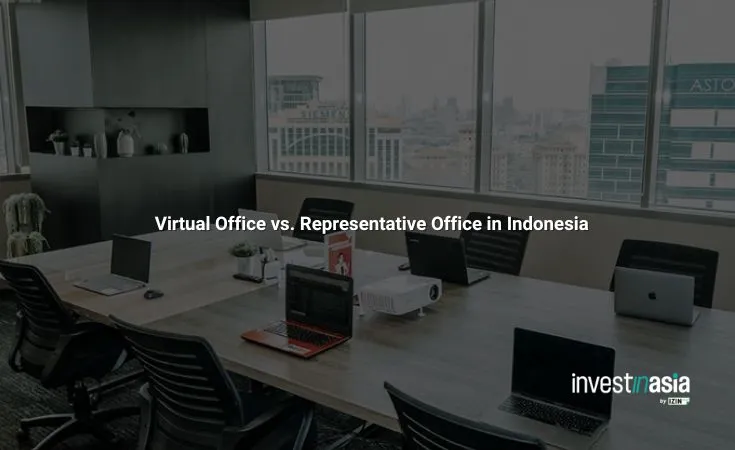When foreign companies plan their market entry into Indonesia, choosing the right business setup is critical. Two common options—virtual office and representative office—offer distinct advantages depending on your goals. This guide explores the differences, compliance needs, costs, and the strategic fit of each option to help you make a well-informed decision.
Also read: The Types of Companies and Business Entities in Indonesia
What Is a Virtual Office in Indonesia?


A virtual office offers a legally recognized business address along with administrative support, all without the need for a physical office. Foreign companies can use these addresses to register their PT PMA (foreign-owned company) and comply with Indonesia’s legal requirements for business domicile.
Virtual offices became legally viable for foreign companies after the Omnibus Law of 2020, which removed restrictions on physical presence. Providers must be PKP-certified and offer access to physical facilities like meeting rooms or coworking spaces.
Also read: Can Foreign Companies Open a Virtual Office in Indonesia?
Key Advantages:
- Lower operational costs
- Premium addresses (e.g., Jakarta CBD)
- Legal compliance with proper providers
- Fast setup and immediate use for PT PMA
- Business support services: mail, receptionist, shared phone line
Virtual offices are ideal for businesses ready for commercial operations or those looking to scale cost-effectively.
Also read: Best Locations for Establishing a Virtual Office in Indonesia
What Is a Representative Office in Indonesia?


A representative office (KPPA) allows foreign companies to conduct market research, build networks, and promote their brand—without generating revenue. It’s a legal entity regulated by BKPM, used mainly for strategic observation and groundwork before committing to a full commercial presence.
There are four types of representative offices:
Permitted Activities:
- Market research
- Liaison with the parent company
- Promotion and coordination
- Preparation for future PT PMA establishment
Also read: Business Activities Allowed for Foreign Representative Offices in Indonesia
Limitations:
- Cannot sign contracts or issue invoices
- Cannot import/export goods
- Cannot directly employ for commercial purposes
Also read: The Limitations of Representative Office in Indonesia
Setup Time
- Time: 14 days
This setup is perfect for businesses testing the market before making major investments.
Also read: Required Licenses and Permits for a Foreign Representative Office in Indonesia
Virtual Office vs. Representative Office: A Comparative Look
| Feature | Virtual Office | Representative Office |
|---|---|---|
| Legal Structure | Requires PT PMA | Separate legal entity (KPPA) |
| Revenue Generation | Allowed | Prohibited |
| Setup Cost | IDR 2–4 million annually | IDR 12.5–16 million (setup only) |
| Operational Scope | Full commercial activities | Market research, liaison only |
| Physical Office Requirement | Shared office access | Dedicated office in capital city |
| Setup Time | 1–7 business days | 30–60 days |
| Scalability | High | Limited |
Which One Should You Choose?
Go with a Virtual Office if:
- You already have or plan to establish a PT PMA
- You need to operate commercially from day one
- Flexibility, fast setup, and low cost are priorities
- Your company operates in the digital, service, or online commerce sector
Also read: Forbidden Business Sectors for Virtual Office in Indonesia
Choose a Representative Office if:
- You’re in the exploratory phase
- You need formal government recognition for strategic reasons
- You plan to convert to a PT PMA within 3–15 years
- You want to employ staff for non-commercial activities like research
Consider a Hybrid Strategy
Many companies begin with a representative office for risk-free research and transition to a PT PMA with virtual office support once they are ready for commercial operations.
Regulatory Landscape and Compliance
Indonesia’s regulatory environment has become increasingly favorable to foreign investors. The Omnibus Law, PMK 81/2024, and updates from BKPM have made both virtual and representative office setups more accessible. Still, working with experienced local providers ensures your setup remains compliant and avoids costly delays.
InvestinAsia and vOffice: Trusted Partners for Market Entry
For a reliable, cost-effective entry into Indonesia:
- Use InvestinAsia’s Representative Office Setup if you’re starting with research and market evaluation. Our experienced team handles documentation, BKPM compliance, and office setup end-to-end.
- Choose vOffice’s Virtual Office Service if you’re ready for commercial operations with a PT PMA. Their premium locations give you a professional presence instantly.
Both services are optimized for foreign investors navigating Indonesia’s complex business setup.
The right choice between a virtual office and a representative office depends on your business goals, timeline, and budget. A virtual office enables immediate commercial activity through a PT PMA, while a representative office offers a strategic, low-risk market entry path. For reliable assistance, InvestinAsia and vOffice offer specialized services to help you get started with full legal compliance and business efficiency.
Frequently Asked Questions (FAQs)
Can I open a virtual office without setting up a PT PMA?
No. Virtual offices in Indonesia can only be used for businesses that have or plan to establish a PT PMA or other legal entity.
How long can a representative office operate?
A KPPA is valid for 3 years, with extensions allowed up to a total of 15 years before conversion is required.
Do I need a local partner for either setup?
No. Both virtual and representative offices allow 100% foreign ownership, though local advisors are recommended for compliance.
Which option is cheaper?
Virtual offices are generally much cheaper in both setup and operational costs, especially for startups or service-oriented businesses.
Can a representative office make money in Indonesia?
No. Representative offices are strictly prohibited from commercial activities such as selling products or signing contracts.




